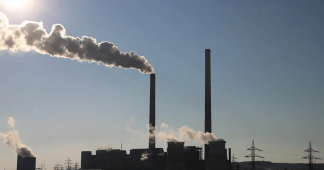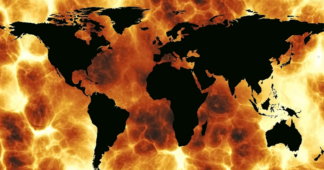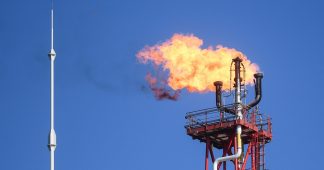Climate change is no longer a future problem. It is a now problem,” said the UNEP executive director. “The clock is ticking loudly.”
By Jessica Corbett
Countries’ current climate pledges put the world “on track for a catastrophic global temperature rise” of about 2.7°C, United Nations Secretary-General António Guterres warned Tuesday, calling a new report released ahead of a key summit “another thundering wake-up call.”
The Emissions Gap Report 2021, an annual assessment from the U.N. Environment Program (UNEP), comes as world leaders prepare to meet in Glasgow, Scotland on Sunday for COP 26. They are set to discuss efforts to meet the Paris climate agreement, which aims to keep global temperature rise this century “well below” 2°C, preferably limiting it to 1.5°C.
However, countries’ latest Nationally Determined Contributions (NDCs), along with other commitments made for 2030, suggest the international community will blow past both of those targets without more ambitious action to slash emissions, according to the UNEP report.
?️ The Heat Is On.
? The clock is ticking loudly.
⚠️ To stand a chance of limiting global warming to 1.5°C, we have just 8 years to almost halve greenhouse gas emissions.The world needs urgent #ClimateAction ambition NOW to close the #EmissionsGap: https://t.co/gaHrBkkBDj pic.twitter.com/56HQMbm34i
— UN Environment Programme (@UNEP) October 26, 2021
“The emissions gap is the result of a leadership gap,” Guterres declared in his Tuesday address, noting that the report “shows that countries are squandering a massive opportunity to invest Covid-19 fiscal and recovery resources in sustainable, cost-saving, planet-saving ways.”
“Scientists are clear on the facts. Now leaders need to be just as clear in their actions,” he said. “They need to come to Glasgow with bold, time-bound, front-loaded plans to reach net-zero.”
“To decarbonize every sector—from power, to transport, farming, and forestry. To phase out coal,” the U.N. chief continued. “To end subsidies for fossil fuels and polluting industries. To put a price on carbon, and to channel that back to creating green jobs. And obviously, to provide at least $100 billion each year to the developing world for climate finance.”
“Leaders can still make this a turning point to a greener future instead of a tipping point to climate catastrophe,” said Guterres. “The era of half-measures and hollow promises must end.”
Various assessments released before the summit in Scotland have underscored the necessity of bold and immediate action, including the latest from the Intergovernmental Panel on Climate Change as well as the World Meteorological Organization’s announcement Monday that carbon dioxide concentrations in 2020 hit levels not seen for roughly three million years.
Reflecting “a world of climate promises not yet delivered,” the new UNEP report also serves as a call to action, particularly for rich nations most responsible for the climate emergency.
The report details how parties to the Paris agreement have put forth “insufficient” climate plans. The NDCs for 2030, if continued throughout this century, would still lead to a global temperature rise of 2.7°C beyond pre-industrial levels. Achieving nations’ net-zero pledges “would improve the situation, limiting warming to about 2.2°C” by 2100.
However, Group of 20 (G20) nations—the world’s top economies—”do not have policies in place to achieve even the NDCs,” the report says, and making changes to meet the 2030 commitments would not be enough to put countries on a “clear path towards net-zero.”
The latest @UNEP #EmissionsGap Report finds new and updated Nationally Determined Contributions only take 7.5% off predicted 2030 emissions compared to previous commitments. Reductions of 30% are needed to stay on the least-cost pathway for 2°C and 55% for 1.5°C. (3/n) pic.twitter.com/cO1GyWozku
— Joeri Rogelj (@JoeriRogelj) October 26, 2021
Meanwhile, this year “thousands of people have been killed or displaced and economic losses are measured in the trillions,” the report highlights, pointing to “extreme weather events around the world—including flooding, droughts, wildfires, hurricanes, and heatwaves.”
As Inger Andersen, executive director of UNEP, put it: “Climate change is no longer a future problem. It is a now problem.”
“To stand a chance of limiting global warming to 1.5°C, we have eight years to almost halve greenhouse gas emissions: eight years to make the plans, put in place the policies, implement them and ultimately deliver the cuts,” Andersen said. “The clock is ticking loudly.”
“The world has to wake up to the imminent peril we face as a species,” she added, calling on countries to urgently implement policies to meet existing commitments. “It is also essential to deliver financial and technological support to developing nations—so that they can both adapt to the impacts of climate change already here and set out on a low-emissions growth path.”
The report factors in new or updated NDCs from 121 parties, responsible for just over half of planet-heating emissions, submitted by the end of September as well as pledges from China, Japan, and South Korea—though countries continue to put forward plans in the lead-up to the summit.
Alok Sharma, incoming COP 26 president, noted Tuesday that previous analyses projected “commitments made in Paris would have capped the rise in temperature to below 4°C.”
“So there has been progress, but not enough,” he said, referencing the new report. “That is why we especially need the biggest emitters, the G20 nations, to come forward with stronger commitments to 2030 if we are to keep 1.5°C in reach over this critical decade.”
Published atwww.commondreams.org
We remind our readers that publication of articles on our site does not mean that we agree with what is written. Our policy is to publish anything which we consider of interest, so as to assist our readers in forming their opinions. Sometimes we even publish articles with which we totally disagree, since we believe it is important for our readers to be informed on as wide a spectrum of views as possible.











